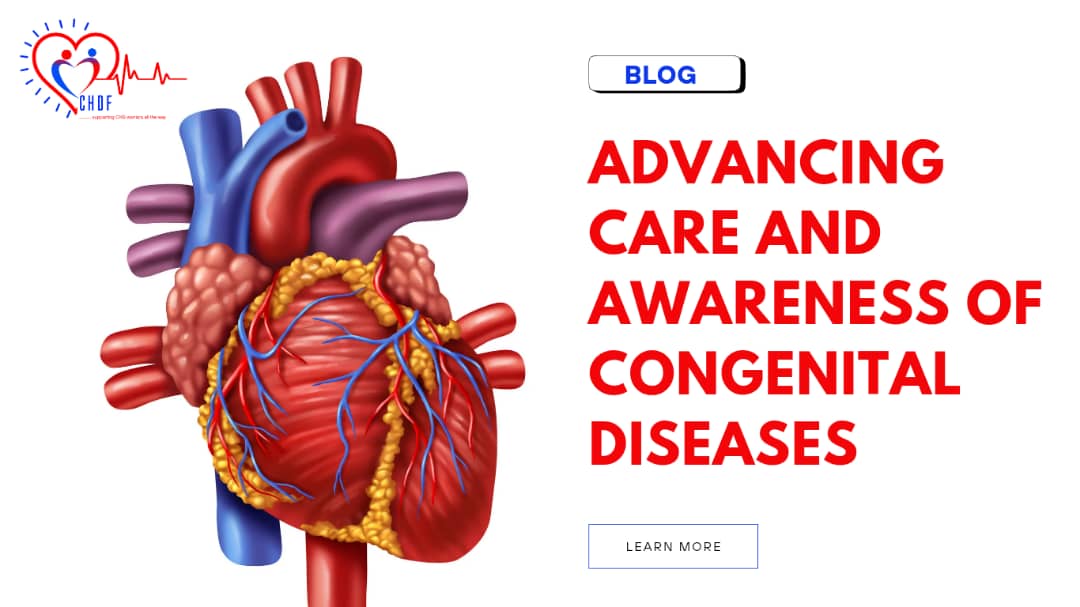
Webinar: Understanding Congenital Diseases
The Congenital Heart Disease Foundation of Nigeria (CHDFNIGERIA) held its first webinar for the year on Thursday 5th August, 2024. Themed ‘Advancing Care and Awareness of Congenital Diseases’, the event featured seasoned guest speakers namely; Dr. Nwala Gabriel Chuks, a Consultant Paediatrician/Neurologist at Limi Hospital and Dr. Isaac Chukwu, a Consultant Paediatric Surgeon at Federal Medical Centre, Umuahia (MBBS, FWACS)
Dr. Nwala Gabriel Chuks gave a presentation on Understanding Congenital Diseases. During his talk, Dr. Chuks spoke extensively on congenital anomalies. He explained the term “congenital anomalies” which refers to abnormalities that exist from the moment a child is born. These manifestations might be physical or show up in the child’s normal health representations from birth. If the index of suspicion is not heightened, the problem remains unknown. In addition to congenital anomalies, some abnormalities can be life threatening, meaning that the infant may not survive for a few hours or weeks after delivery if nothing is done. Statistics reveal that globally, 2.7 million deaths that happen within the neonatal period are because of congenital anomalies. The number of anomalies present in developing countries is largely unknown due to the uncoordinated database. It is said that about 2.5% of infants across the globe have an abnormality. The major reasons why children are born with congenital anomalies include:
- Underlying genetic abnormalities
- Infections from the mother such as rubella, herpes, HIV, etc.
- Environmental factors from exposure to toxins and air pollution
- Dietary factors and malnutrition:
- folate deficiency – if from conception till 28 days of life the folate levels in the mother are low, the child would have an abnormally formed brain and spinal cord),
- obesity – this can lead to maternal or gestational diabetes that would have effects on the child such as cardiac, digestive, respiratory abnormalities, etc. An obese mother can have a microsomic baby.
- alcohol – if the mother consumes a lot of alcohol while pregnant, it can lead to fetal alcohol syndrome which would affect the growth and development of the child,
- tobacco
- psycho-stimulants – the consumption of hard drugs and substances
The most life-threatening anomalies are cardiac, followed by anorectal, genitourinary, gastrointestinal, skeletal, respiratory, genetic, and others. For babies born at term, congenital anomalies may have better outcomes compared to premature that have a poorer prognosis. In terms of outcome, the survival rate increases to 80-90%, that is 65 years of survival, with the availability of paediatric surgical interventions, as opposed to merely 5 years. He advised that proper screening should be done during antenatal care as well as a thorough physical examination of the baby when it is delivered for early anomaly detection.
The presentation on Advancements in Treatment and Management was delivered by Dr. Isaac Chukwu as he emphasized the implication of congenital diseases on universal health coverage with statistics showing that ‘9 out of 10 children born with congenital anomalies are in low- and middle-income countries’. He stated that managing congenital anomalies involves a multifaceted approach. It is beyond repairing the structural defects or giving medications for the functional defects. The treatment involves creating a lot of awareness in communities, otherwise the indices would increase over the years. Awareness creation helps in several ways, such as:
- Early detection
- Prevention
- Reducing stigma and discrimination
- Supporting families
- Advancing policies and advocacy
This can be achieved through public health campaigns in communities, schools, and hospitals, education campaigns by leveraging print, social and digital media, prenatal and genetic counselling for women of reproductive age, community involvement, and research and data collection. With advancement in care, especially in low- and middle-income countries, little progress has been made in the spectrum of care, that is, in the use of minimal access therapy and prenatal therapy. Most of the advancements have been in genomic medicine – understanding the genetic causes to the anomalies, 3D printing – which helps to localise masses like neck and abdominal masses, and resect them without injuring the surrounding organs, and minimally invasive therapy.
Early diagnosis helps in ensuring better outcomes and decrease the cost of care as diagnostic methods are used. Prenatal ultrasound, non-invasive, etc., is readily available and can be used, particularly in the second trimester, to identify any defects. Early diagnosis also leads to early treatment. The treatment methods can be surgical and non-surgical. Non-surgical treatments include the use of medications, physical therapy and rehabilitation, speech therapy, nutritional therapy, etc. Surgical care includes corrective therapy, reconstructive therapy, minimally invasive and open surgery, etc.
Every party involved has its own role to play. The role of health workers involves early detection, diagnosis and management, prenatal screening and counselling, and training. The researchers’ role involves the discovery of new therapy, the causes and prevention of these anomalies, and assess the effectiveness of the interventions and proffer new ones. Nonprofit organisations and advocates can raise awareness, promote research and influence policy, improve healthcare access and services, and build the capacity of healthcare workers. In his last words, he said ‘Together, we can pave the way for a society where congenital anomalies are managed with the highest standards’.
Our Founder, Mrs Christianah Onasanya, formerly Oyeleye, spoke about Supporting Parents and Families with Congenital Diseases/Congenital Heart Diseases. She discussed Atrial Septal Defect (ASD), the second most common congenital heart defect. She defined ASD as ‘a defect characterised by hole or communication between both sides of the atrium, that is, the upper part of the heart’. The corrective treatment for ASD is surgery or due to the advancement of technology, a device closure in the cardiac catheterization laboratory. Another treatment is the traditional open heart surgery. In Nigeria, the device closure and open heart surgery cost about 5 million -10 million naira. She emphasized the need for heart families to know that surgical intervention does not completely fix congenital heart defects. CHDs especially the complex CHDs usually require lifelong management, follow up care, investigations and sometimes repeat surgery. As aforementioned, it takes a multidisciplinary team to care for a congenital heart disease patient. In advanced countries, specialists such as speech and language therapist, play specialist, nutritionist and dietician, and the core clinical team – doctors, nurses and surgeons, are available to provide care.
The different kinds of support required by families with congenital heart disease patients include:
- Emotional support – This involves teaching them coping skills, stress management and journaling
- Educational support – It is important to help families understand the abnormalities in their child to ensure they can actively participate in the care.
- Physical support – This can be done by providing accommodation as many family are separated, or cant get group sleep while caring for children with CHD in the hospital.
- Financial support – Due to the high cost of surgery, the lack of support from the government and the poor insurance coverage, their jobs might be threatened. Provisions could be made to support their surgical and personal needs.
- Medical support – This requires empathy from the healthcare professionals.
- Support groups – Advocacy and community groups can help teach families, help them cope and support other families in the same condition.
- Spiritual care – This involves pastoral care or spiritual activities to help strengthen their faith.
- Mental health – Due to CHD complexities and many set back in the Nigerian healthcare system, some families may experience anxiety, depression, etc that requires mental health support.
Much work must be put into managing congenital diseases in order to prevent the deaths of newborns and children under five. Organisations, charities, the healthcare workforce, carers, advocates, policy makers, ministries of health, the government, and parents need to form both local and international partnerships. She encouraged participants to quit talking and start doing.
In conclusion, as we continue to navigate the complex landscape of congenital diseases, it is important that we unite in our efforts to advance care and awareness and strive towards better outcomes and improved quality of life for those affected by these conditions.
Remember, ‘Together, we can close the gap’.
Take Action, sign our World Heart Day petition.
All Categories
+(234) 8149190907
chdfnigeria@gmail.com
